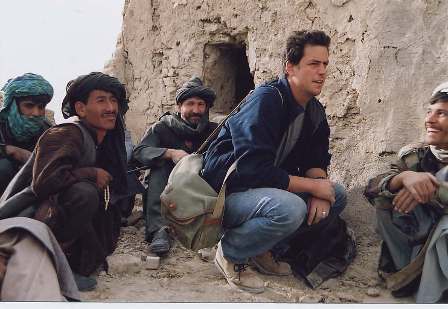
Alex Perry has told many stories, like the time he was banged up in a Zimbabwe prison or when he witnessed the first American deaths in Afghanistan in 2002.
But it is one of the new buzz words in the dictionary -- globalization -- that finally led Perry, Time magazine's Africa bureau chief to write his first book Falling off the Edge: Globalization, World Peace and Other Lies.
In the book -- written with the lightness of touch but journalistic rigor that is evident in his Time reporting -- Perry uses his experiences as a foreign correspondent in Asia and Africa to weigh up the new market theories that tell us that globalization is inevitable, universally beneficial... and y'all love it, just you wait.
"I actually resisted finding a central theme to draw from my experiences for a long time. I distrust neat, unifying themes -- if they're neat, and about the world, they almost have to be wrong because the world is such a diverse, messy place," Alex Perry told the Huffington Post.
Despite this initial reluctance, Perry said that when reporting on the explosion of crime and disenfranchisement, the worsening of pollution and spread of disease, and the impending climate disaster and diseases, he started to believe that most could be traced back to an unguarded enthusiasm for globalization.
"I couldn't help notice striking similarities between disparate conflicts -- all the more striking for how disparate and geographically separate those wars were. And those similarities had to do with the basic dynamics of conflict -- inequality, alienation, frustrated expectations, the crushing of individual identity in the name of a global standardization, the perception of imperialism, and victimhood."
<
Alex Perry at Qala-i-Jangi fort, northern Afghanistan. Photo credit: Damien Delgueldre.
Most compelling is Perry's argument that the terrorist movements of the last twenty years stem from creeping globalization. He told the Huffington Post:
"Globalization is capitalism -- and capitalism is human nature. The problem with globalization is that it is unregulated capitalism -- we don't have global regulators. So globalization is capitalism out of control. [W]ars are started just as much by perceived slights and injuries as real ones. I don't think that al Qaeda is right that the US is trying to wipe Islam off the face of the earth, for instance. But many Islamists do believe that. And in that case, reality becomes less important than perceived reality. It doesn't really matter that al Qaeda is wrong about being a cornered victim, fighting for the survival of Islam. They believe that. And they've killed thousands in that belief. And that, then, becomes the point."
Globalization promoters (and the West) see themselves as actively support the notion of "freedom to" while the anti-globalization activists (which Perry says, includes Islamists and the Euro left) are more about "freedom from." Perry says that essentially the globalization has a large 'optimism versus pessimism' aspect to it.
"The advocates of globalization see themselves as liberating the world. They're giving the world democracy and capitalism -- freedom, in other words. What's more free than a free for all? And you would see it like that if your idea of your place in the world was defined by dominance, and patrician benevolence -- if you saw yourself as a super-power, in other words. The great frustration you see written on Cheney's face when he's asked about Iraq was because in Iraq, the administration, in Cheney's perception, was being nice. It was liberating people. It was solving terrorism by freeing the world. If these people had no more reasons to be angry, the administration's argument went, terrorism would stop. And that's a brave and bold idea. Laudable. And reasonably sound too. The trouble was in its implementation," says Perry.
"You don't free people at the point of a gun. It just doesn't work. The person on the other end doesn't feel free. He feels oppressed. Invaded. Occupied. Distinctly un-free, in fact. And that segues into the mindset in many parts of the world that are not dominant, that are not powerful, that are not super-powers -- that they are victims and pawns in an iniquitous world order over which they have no control. They see freedom as an absence of something -- often the absence of oppressive government, and often also the absence super-power interference and influence. Invading their country, armed to the teeth, killing civilians -- well that's the most extreme cause of interference you can get. And it confirms the victim world view: they are, plainly, oppressed by the big, bad bullies who run the world."
For all the reservations Perry says he's not anti-globalization.
"I don't think any reasonable or realistic person can be. Again, globalization just is. Being anti-globalization is like being anti-life. You can't do it; rather, the thing to do is to understand it better, and thereby make it more bearable for those at the bottom."
Falling off the Edge: Globalization, World Peace and Other Lies. (published by Bloomsbury and available through Macmillan in the UK from January 31). If you have any questions or comments for Alex Perry, please leave them below.